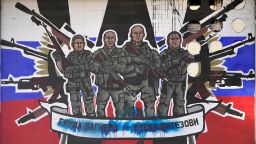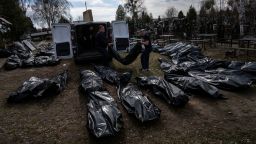Editor’s Note: Marion Messmer is a senior research fellow in the International Security Programme at think tank Chatham House. Her focus is on arms control, nuclear weapons policy issues and Russia-NATO relations. The views expressed in this commentary are her own. Read more opinion on CNN.
Easy to miss in Russian President Vladimir Putin’s speech to parliament last week was a glancing reference to the possibility of Russia resuming nuclear testing.

In a surprise move, Putin said that Russia was ready to resume nuclear weapons tests if the US conducted one first.
While most of the media focus has been on Russia suspending its participation in the New START nuclear arms treaty, this announcement was just as significant, with potentially devastating consequences.
It would signify a further step towards escalation in Ukraine by demonstrating Russia’s intent to use nuclear weapons and could begin another, more devastating, nuclear arms race.
Neither Russia nor the US have conducted a nuclear weapons test since the early 1990s – soon after that, they negotiated the nuclear Comprehensive Test Ban Treaty (CTBT) in Geneva – and although both India and Pakistan conducted nuclear tests in 1998, only North Korea has continued to test nuclear warheads since.
If Russia were to resume tests, other nuclear armed states might follow. North Korea would certainly take this as carte blanche for further tests and there would be concern in the US about potentially falling behind Russia in the development of new nuclear capabilities. All potentially leading to a new arms racing dynamic.
The US has no reason or intention to resume such tests. But by inserting this into his ‘State of the Nation’ speech, Putin appears to be creating a false narrative that the US is working towards a nuclear weapons test to justify Russia breaking the CTBT and once again conducting its own tests.
Indeed, the Russian news agency TASS reported in early February, days before Putin’s speech, that the Novaya Zemlya nuclear test site is ready to resume if needed.
Why might Russia want to begin testing again?
Firstly, as a signal of intent to ride roughshod over all nuclear agreements, demonstrating its capability and resolve – domestically and internationally – to use nuclear weapons.
And secondly, because Russia is developing new nuclear capabilities and has insufficient data without new warhead tests.
Neither reason is comforting. A Russian nuclear weapons test would shatter several decades of international agreements and any sense of certainty in non-proliferation efforts. The CTBT underpins the Non-Proliferation Treaty (NPT) by creating a credible premise that states will reduce their nuclear arsenals over time rather than continuing to expand.
What would Russian nuclear weapons tests mean for other nuclear armed states?
It would foment concerns in other nuclear-armed states that Russia can gain valuable insights from test data which they are currently missing out on.
This could lead to more states testing as they modernize their arsenals. In the US, some political figures would be likely to call for nuclear weapons tests, not wanting to be outdone by Russia or fall behind. A new nuclear arms race would emerge with several nuclear powers competing, amid few remaining treaty constraints.
By abandoning the CTBT and expanding its nuclear arsenals, Russia and any other states joining in a new series of tests would seriously damage the NPT. It is hard to see how it could recover from such a drastic departure of its central promise – that the five Nuclear-Weapon States will reduce their reliance on nuclear weapons – resulting in complete and irreversible disarmament.
It would also increase the potential of other states pursuing nuclear weapons again. South Korea has already hinted several times this year at investing in a nuclear program if the threat from North Korea does not diminish. A return to a global nuclear arms race may push them over the edge.
Nuclear testing could also be read as a signal of further escalation, demonstrating Russia’s resolve to use nuclear weapons in war or an escalation of the conflict between Russia and NATO. It would mean a step change from Putin’s rhetorical threats, to a dangerous reality which could easily spin out of control.
What could be done if Russia was seen preparing for a test?
A Russian nuclear weapons test would not come out of the blue. Intelligence services would be able to see preparations ahead of time. The US and the UK have been sharing regular defense intelligence updates since before the invasion of Ukraine, to signal to Russia that its motives are transparent and to help allies coordinate. They could use this same mechanism to draw attention to an upcoming test and to try to prevent it.
In such an event, the international community should work together to impress upon Russia its seriousness and coherence against a nuclear weapons test.
The response should be to immediately increase sanctions until Russia reverses any test preparations. The European Union should act more quickly on sanctions than it has previously. Knowing the risks, other states who so far have avoided taking a position might switch and join the transatlantic pressure on Russia.
China and India have a key role to play. So far, they have taken an ambivalent stance on Ukraine, abstaining on UN votes and refusing to condemn Russia outwardly. However, they have criticized its nuclear threats.
China has shown that it is not comfortable with such nuclear brinksmanship and equally does not want to see Russia or the US investing in expansion and development of their arsenals. Seeing such test preparations could see China threaten to withdraw its political and economic support for Russia, which would be a heavy blow to Putin’s military ambitions.
What could be done if Russia conducted a test?
By conducting a nuclear weapons test, Putin may well want to frighten Western states into no longer supporting Ukraine. However, it is far more likely that NATO member-states, worried about escalation, would simply double down on their support.
There are no good options in this scenario: a conventional response from NATO might also be an escalation. A change in nuclear alert levels would send a strong signal to Russia but could also provoke further escalation.
A new nuclear arms race would look different from that of the Cold War. It would no longer be largely a race between Russia and the US and would certainly include China – and have other regional nuclear dynamics implications.
In case of a Russian nuclear test, all other nuclear-armed states (with the exception of North Korea which would be unlikely to join) would need to stand together against nuclear testing and work to bring Russia back into compliance.
Get our free weekly newsletter
- Sign up for CNN Opinion’s newsletter.
- Join us on Twitter and Facebook
History has several examples where the world came close to a devastating nuclear war and was saved by good fortune. Relying on good luck is not a great strategy, especially in such a complex and tense situation.
Adding an increasingly isolated Russia, with a president who makes decisions without the potentially tempering input of other senior officials, is a set up for disaster.






